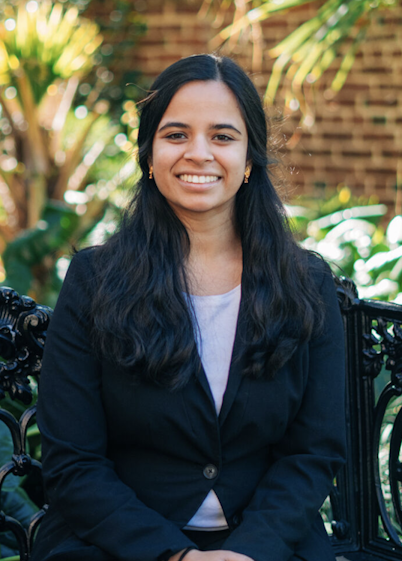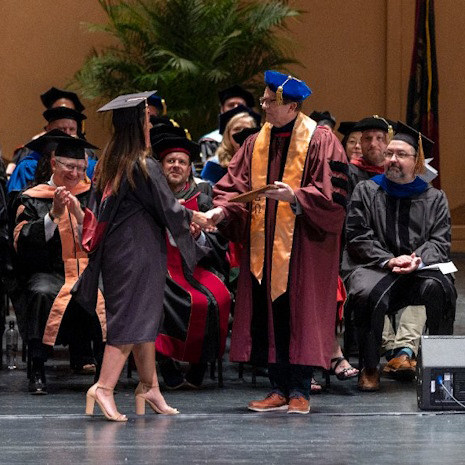
Study Public Health
The Bachelor of Arts (B.A.) curriculum is for students who want to apply the degree to social and behavioral sciences, while the Bachelor of Science (B.S.) is for students who are interested in a broad-based natural science.
May 9, 2024 | Erin Bluvas, bluvase@sc.edu
“Growing up as the daughter of immigrant parents, I have become sensitive to the abundant racial, cultural and gender inequity in the American health care system,” says Greenville native Anusha Ghosh.
Knowing that she wanted to address inequities both in the U.S. and globally, Ghosh selected public health and Spanish has the concentration areas for her BARSC-MD (Accelerated Undergraduate to MD Program) at the South Carolina Honors College (No. 1 in the nation). With plans to attend medical school, she was particularly interested in learning how to use her role as a physician to improve patient-doctor relationships and public health in both clinical and community settings.
"Throughout my years with the Arnold School of Public Health, I have learned that studying local history and culture, relevant health policy, and language may be most helpful when specifically treating patients of historically underserved backgrounds,” she says.

Attending USC was the perfect fit for the Ghosh because she knew she would be surrounded by fellow student leaders. Living in the capital city – particularly in close proximity to the State House – also enabled Ghosh to easily participate in democratic activities.
“From the weekly farmer’s market to the art museum to the Congaree River, there are always so many areas to explore and relax in,” she says. “In becoming a more involved citizen, I have been able to deliver testimony twice regarding the tampon tax bill, an issue I am highly passionate about.”
As a Stamps Scholar, Ghosh co-led the program’s annual convention, which focused on the physiological and public health impacts as well as the economic and political causes of high insulin prices. She also co-founded and served as co-president of No Periods Left Behind (USC’s first menstrual equity-focused organization) and Q+ Honors Caucus (an honors organization that uplifts LGBTQ+ students).
At the Seeking Refuge Podcast (which elevates refugee and migrant voices), she held the role of vice president, and with Phi Delta Epsilon (a pre-medicine fraternity), she served on the diversity, equity and inclusion committee. She also holds multiple health and emergency certifications (e.g., firefighting, certified nursing assistant) and is a graduate of the Draw Your Way Through Medicine Fellowship (a program that uses drawing as a tool to improve health literacy.
Ghosh’s international experiences include participation in Global Health USC in Costa Rica and participation in the American Institute of Indian Studies Bangla Program in Kolkata, India. Closer to home, she volunteers at the Columbia Free Medical Clinic and answers calls for the sexual assault hotline at Pathways to Healing. She also gives tours at the Anne Frank Center.
Working with her peers, Ghosh has won two major competitions. The first was the Tulane Health Policy Case Competition, where she and classmates Muskaan Makkar and Hima Vadlamani developed solutions to the New Orleans homelessness crisis. Partnering with Thrisha Mote, Aastha Arora and Jiya Desai, Ghosh also won the Pay It Forward State Competition for their proposal to end rural period poverty by using school and non-profit partnerships.
Despite completing her undergraduate degree in just three years and finding time for her many extracurricular activities, Ghosh engaged in two major research projects outside of her coursework. With support from two Magellan grants, she conducted a historical analysis of health institutions, professionals and advocates in Columbia during the Civil Rights Movement.
Just weeks after stepping on campus as a freshman, Ghosh undertook a research assistantship with the Department of Health Services Policy and Management (HSPM). With HSPM associate professor Christina Andrews as principal investigator, Ghosh has worked on the addiction expert’s National Institutes of Health-funded study into Medicaid coverage and management for treating opioid use disorder for nearly three years. Andrews and health promotion, education, and behavior faculty member Deborah Billings have served as important mentors during Ghosh’s time at USC.
“They have inspired me greatly in pursuing my own topics in public health research and advocacy, particularly as a young college student,” she says. “Both of these mentors have supported me by providing advice and guidance in my various endeavors, such as by helping to dissect the role of pharmacy benefit managers in high insulin prices to understand intricacies of starting a student-led menstrual equity organization on campus.”
In July, Ghosh will begin her studies at the USC School of Medicine Columbia. Her plan is to become double board certified in both emergency and family medicine.
“This approach will allow me to address health inequities in the emergency room, an area of the health care field where many public health issues are exacerbated, particularly for minoritized and immigrant populations,” says Ghosh, who says a master of public health, health policy or history may be in her future as well. “This path will also give me the ability to work in free primary care clinics in my area and host week-long clinics in my parents’ state and country, West Bengal, India. I’d like to use my position as a physician to engage in public health leadership to systemically address health inequities and community health concerns.”

The Bachelor of Arts (B.A.) curriculum is for students who want to apply the degree to social and behavioral sciences, while the Bachelor of Science (B.S.) is for students who are interested in a broad-based natural science.

The Arnold School is proud of our 2024 graduates, who will go on to change the world locally and globally. Learn about some of the other outstanding individuals who completed one of our 34 programs this year.